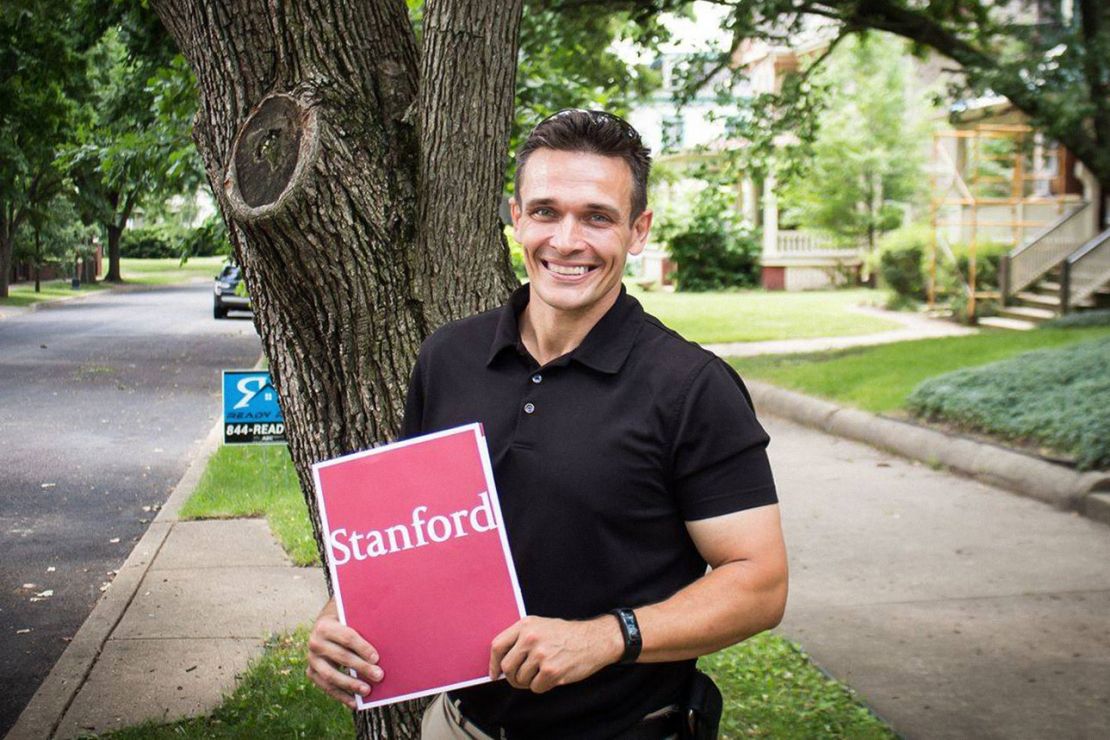At the end of his junior year at Stanford, Jason Spyres received a public service fellowship from the university that allowed him to partner with the nonprofit Prison Scholar Fund, which helps formerly incarcerated people pursue a college education.
During the summer fellowship awarded by the Haas Center for Public Service, he produced videos offering advice and encouragement to people with criminal records who want to enroll in or return to school – from community colleges to major universities.
Theirs is a quest that is close to his heart.
Spyres began his Stanford studies as a transfer student in September 2018, one year after completing a 15-year sentence for selling cannabis.
He is now a senior majoring in computer science.
His journey to the university began the day he watched a television interview with a Stanford admission officer who said she was especially impressed by candidates who had accomplished much with few resources.
At the time, Spyres was sitting in a prison cell in Illinois.
“I looked around my room and asked what resources do I have,” he recalled. “I have a pencil and an 8½ -by-11 writing pad. I have stamps and a prison library card.”
Created an independent study program
Spyres decided to put his resources to work. He created an independent study program – borrowing outdated college textbooks from the prison library and writing to schools across the country to request newer editions. He studied six hours a day, six days a week, each morning claiming one of the tables in the prison’s dayroom as his desk.
“The first book I checked out of the prison library was on economics,” he said. “Then molecular chemistry, then physics, then organic chemistry. Next came calculus, which gave me the confidence to redo the physics, which was much easier after doing calculus. I didn’t have a calculator, so I did all the calculations by hand.”
Spyres took copious notes. At one point, the pile of hand-written notes on his dayroom desk stood higher than his 1,000-page molecular chemistry textbook.
While Spyres planned to attend community college after his release, transferring to Stanford or another four-year university became the goal that sustained him.
“Stanford changed my life at that moment, whether I got in or not,” he said. “They just wanted to see that I did the best I could with the situation I was placed in. Now, I placed myself in that situation. But the person standing there at that moment was not a criminal any longer. I had already turned away from those kinds of thoughts and grown past them. But I was still stuck with serving the time.”
Perspective welcomed in the classroom
During his first quarter at Stanford, Spyres enrolled in an introductory programming course taught by Mehran Sahami, an award-winning professor of computer science who is known for his engaging and inspirational teaching style.
“I saw the power of computer science and was intrigued,” Spyres said.
He found his academic path – and decided to major in computer science – after taking “Ethics, Public Policy, and Technological Change,” a course taught by Sahami and two political science professors who examine new developments in computing technology through the lenses of philosophy, public policy, social science and engineering.
Spyres, who is now 39, found that his life experiences, including his work as an advocate for criminal justice reform, had given him a unique perspective on issues raised in the class.
During one discussion about replacing money bail with a risk assessment system based on artificial intelligence, Spyres pointed out that a simple algorithm would treat two people with gun charges on their records as if they posed the same risk to society. But what if one was a heroin dealer who dumped his drugs before he was arrested for possessing an illegal shotgun, and the other was a deer hunter cited for an expired hunting license, he asked.
“At Stanford, my perspective is listened to and challenged, and at times disproven,” he said. “But the mere fact that I’m in the room has altered the course of the conversation.”
Spyres also shared his perspective on another pressing social issue in a research paper he wrote for a class offered by the Program in Writing and Rhetoric titled: I Beg Your Pardon: When We Legalize Cannabis, We Should Pardon All Cannabis Offenses.
Don’t give up hope
In the videos Spyres produced for the Prison Scholar Fund as a summer fellow at the Haas Center, he discussed issues of particular concern to formerly incarcerated people who have set their sights on college, including if, when and how to reveal a criminal conviction.
He also talked about an additional step they should take – to personally confirm that every community college where they took classes, including those offered in prison, had forwarded their transcripts. A missing transcript can derail an application, said Spyres, who earned credits at five community colleges before, during and after prison.
In a recent interview, Spyres said he is not unique in his determination to forge a new path through higher education. He urged people in similar situations to believe in themselves.
“If you are disenfranchised, be it by being a felon, poor or a minority, I implore you to not give up hope,” he said. “Go after your dreams as if nothing can stop you.”
